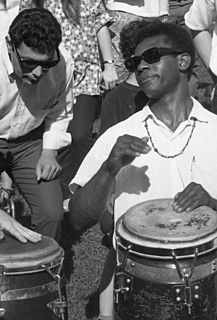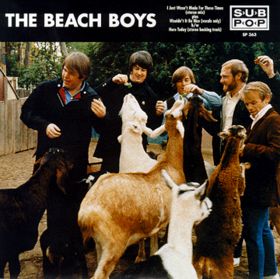Backbeat: Earl Palmer's Story is the biography of pioneer rock and roll drummer Earl Palmer. The book is by music journalist Tony Scherman with a foreword by Wynton Marsalis. More than half the text is directly quoted from Palmer, making the book as much an autobiography as it is a biography.

A biography, or simply bio, is a detailed description of a person's life. It involves more than just the basic facts like education, work, relationships, and death; it portrays a person's experience of these life events. Unlike a profile or curriculum vitae (résumé), a biography presents a subject's life story, highlighting various aspects of his or her life, including intimate details of experience, and may include an analysis of the subject's personality.
Rock and roll is a genre of popular music that originated and evolved in the United States during the late 1940s and early 1950s from musical styles such as gospel, jump blues, jazz, boogie woogie, and rhythm and blues, along with country music. While elements of what was to become rock and roll can be heard in blues records from the 1920s and in country records of the 1930s, the genre did not acquire its name until 1954.

A drummer is a percussionist who creates music using drums.
The story begins with Palmer as a four-year-old vaudeville tap dancer and continues with the story of New Orleans music and the emergence of a strong rock and roll drumming style featuring the back beat. After his triumphs in the city, Palmer moved to Los Angeles, where he became one of the top session musicians and arrangers of the 1950s through the 1970s, playing on hundreds of hits, from "La Bamba" to Percy Faith and Frank Sinatra.

Vaudeville is a theatrical genre of variety entertainment born in France at the end of the 18th century. A vaudeville is a comedy without psychological or moral intentions, based on a comical situation. It was originally a kind of dramatic composition or light poetry, usually a comedy, interspersed with songs or ballets. It became popular in the United States and Canada from the early 1880s until the early 1930s, but the idea of vaudeville's theatre changed radically from its French antecedent.

New Orleans is a consolidated city-parish located along the Mississippi River in the southeastern region of the U.S. state of Louisiana. With an estimated population of 393,292 in 2017, it is the most populous city in Louisiana. A major port, New Orleans is considered an economic and commercial hub for the broader Gulf Coast region of the United States.

In music and music theory, the beat is the basic unit of time, the pulse, of the mensural level. The beat is often defined as the rhythm listeners would tap their toes to when listening to a piece of music, or the numbers a musician counts while performing, though in practice this may be technically incorrect. In popular use, beat can refer to a variety of related concepts including: pulse, tempo, meter, specific rhythms, and groove.
The sections quoting Palmer are colorful, frank, and direct, giving the full flavor of his life as a musician. For example, speaking of playing on Little Richard's records:

Richard Wayne Penniman, known as Little Richard, is an American recording artist, musician, singer, songwriter and actor.
- "Richard's music was exciting as a sumbitch. I'm not talking about the quality of it. It wasn't quality music. It wasn't no chords. It was just blues. "Slippin' and Slidin'" sounded like "Good Golly Miss Molly" and they both sounded like "Lucille". It was exciting because he was exciting. Richard is one of the few people I've ever recorded with that was just as exciting to watch in the studio as he was in performance."
The book includes an extensive discography and notes.
Discography is the study and cataloging of published sound recordings, often by specified artists or within identified musical genres. The exact information included varies depending on the type and scope of the discography, but a discography entry for a specific recording will often list such details as the names of the artists involved, the time and place of the recording, the title of the piece performed, release dates, chart positions, and sales figures.









